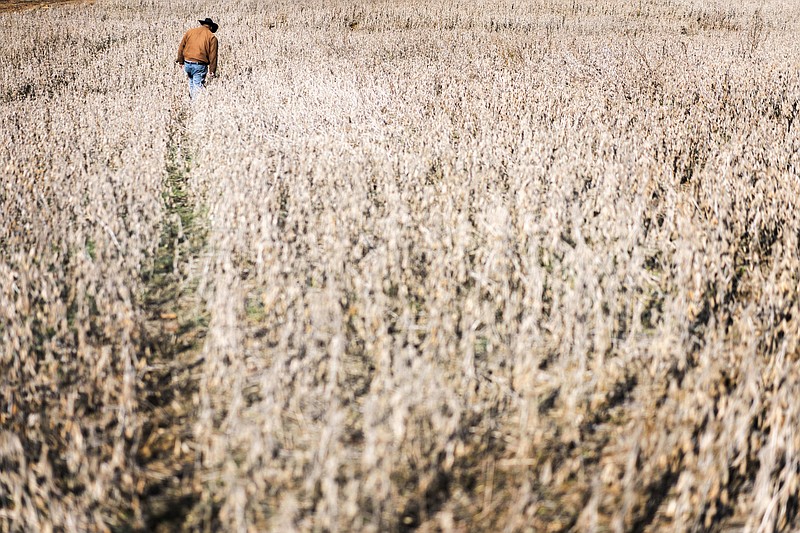WASHINGTON -- A little-known element of President Joe Biden's huge stimulus relief package would pay billions of dollars to disadvantaged farmers -- a provision that would benefit Black farmers in a way that some experts say no legislation has since the Civil Rights Act of 1964.
Of the $10.4 billion in the American Rescue Plan that would support agriculture, about half would go to disadvantaged farmers, according to estimates from the Farm Bureau, an industry organization. About a quarter of disadvantaged farmers are Black. The money would provide debt relief as well as grants, training, education and other forms of assistance aimed at acquiring land.
While it's a relatively small fraction of the $1.9 trillion bill, advocates say it still represents a step toward righting a wrong after a century of mistreatment of Black farmers by the government and others. Some say it is a form of reparations for Black Americans who have suffered a long history of racial oppression.
"This is the most significant piece of legislation with respect to the arc of Black land ownership in this country," said Tracy Lloyd McCurty, executive director of the Black Belt Justice Center, which provides legal representation to Black farmers.
Black farmers in the United States have lost more than 12 million acres of farmland over the past century, mostly since the 1950s, a result of what agricultural experts and advocates for Black farmers say is a combination of systemic racism, biased government policy, and social and business practices that have denied Blacks equitable access to markets.
Discrimination started a century ago with federal Homestead Acts that offered mainly white settlers deeply subsidized land. Since then, local U.S. Department of Agriculture offices that distribute loans frequently have been found to deny Black farmers access to credit and to ignore or delay loan applications. Many Black farmers do not have clear title to their land, which makes them ineligible for some USDA loans to purchase livestock or to cover the cost of planting, and they seldom have benefited from subsidy payments or trade mitigation compensation -- almost all of President Donald Trump's $28 billion bailout for farmers affected by the China trade war went to white farmers.
Today, the average operation of a Black farmer is about 100 acres, compared with the national average of about 440 acres, according to the last farm census. The Center for American Progress found that in 2017, the average full-time white farmer brought in $17,190 in farm income, while the average full-time Black farmer made $2,408.
LAND OWNERSHIP FELL 90%
Many civil-rights advocates say the USDA's own practices have resulted in the loss of land and generational wealth for Black families.
"For generations, socially disadvantaged farmers have struggled to fully succeed due to systemic discrimination and a cycle of debt," Agriculture Secretary Tom Vilsack said in a statement Saturday. "On top of the economic pain caused by the pandemic, farmers from socially disadvantaged communities are dealing with a disproportionate share of covid-19 infection rates, hospitalizations, death and economic hurt."
Of the 3.4 million farmers in the United States today, 45,000 are Black, according to the USDA, down from 1 million a century ago. Land ownership by Black farmers peaked in 1910 at 16 million to 19 million acres, about 14% of total agricultural land, according to the Census of Agriculture. A century later, 90% of that land had been lost. white farmers now account for 98% of the acreage, according to USDA data.
"It does my heart good to know that my 91-year-old father is alive to see what he's been trying to accomplish for the last 30 years come to fruition," said Abraham Carpenter, a Black farmer from Grady. He says this debt relief represents a lifelong dream for many Black farmers.
"We have been held hostage by the USDA for so many years," he said. "Most people don't realize how it feels to be mistreated. They don't know what it feels like to be placed in a position where you cannot help yourself or your family."
REPUBLICAN OPPOSITION
The relief measure for Black farmers did not go unchallenged in Congress, with 49 Republican senators voting against it.
Republican Sens. Steve Daines of Montana, Patrick Toomey of Pennsylvania and Tommy Tuberville of Alabama wrote amendments to strike the $4 billion in debt forgiveness from the bill. Sen. Mike Braun, R-Ind., filed an amendment to strike that section and replace it with $1 billion for rural broadband.
"This bill is not about responding to covid," Toomey said in a statement. "It is about exploiting the final stretch of a public health crisis in order to enact a longstanding liberal wish-list for years into the future [including] sending payments to farmers and ranchers equal to 120% of their borrowings, irrespective of their earnings, wealth or effects from covid, and exclusively for ethnic minorities or immigrants."
The stimulus bill provides grants and loans to improve land access and address heirs' property issues (such as when a farmer dies without a will and the land is divided up among all legal heirs), establishes a racial equity commission to address systemic racism at the USDA, and provides financial support for research and education at historically Black colleges and land grant universities.
"Hopefully the money won't go to conducting studies -- Black farmers have been studied to death," said Lloyd Wright, who was director of the USDA's Office of Civil Rights during the Clinton and Obama administrations.
